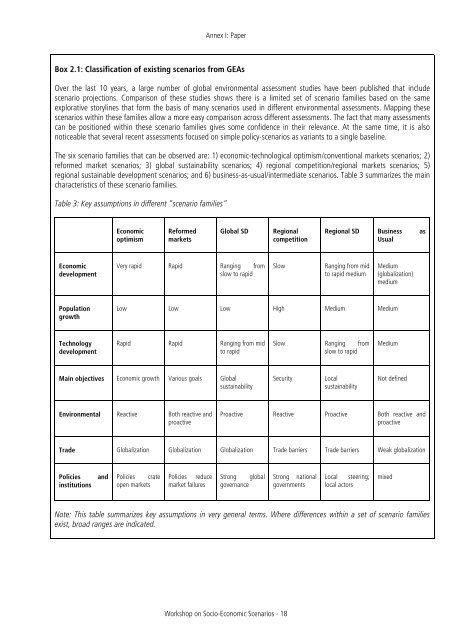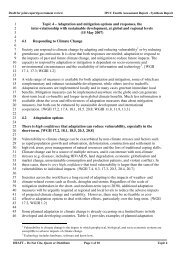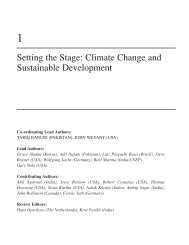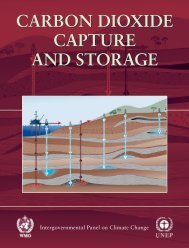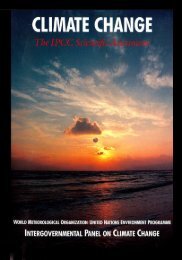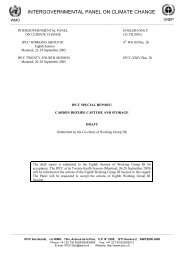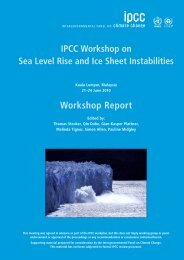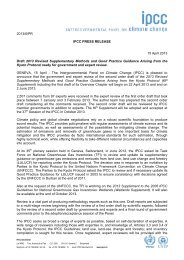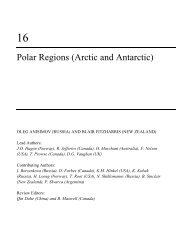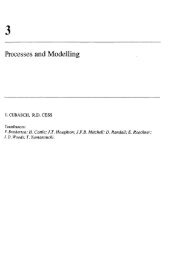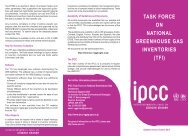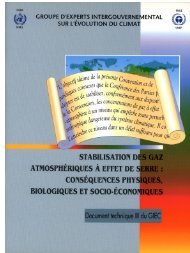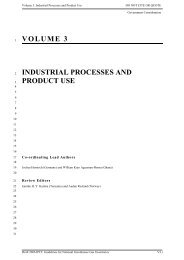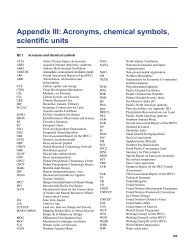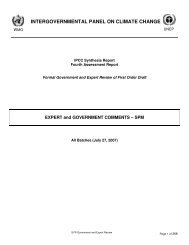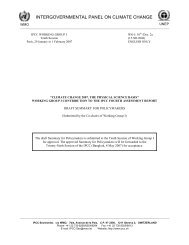Workshop Report - IPCC
Workshop Report - IPCC
Workshop Report - IPCC
You also want an ePaper? Increase the reach of your titles
YUMPU automatically turns print PDFs into web optimized ePapers that Google loves.
Annex I: Paper<br />
Box 2.1: Classification of existing scenarios from GEAs<br />
Over the last 10 years, a large number of global environmental assessment studies have been published that include<br />
scenario projections. Comparison of these studies shows there is a limited set of scenario families based on the same<br />
explorative storylines that form the basis of many scenarios used in different environmental assessments. Mapping these<br />
scenarios within these families allow a more easy comparison across different assessments. The fact that many assessments<br />
can be positioned within these scenario families gives some confidence in their relevance. At the same time, it is also<br />
noticeable that several recent assessments focused on simple policy-scenarios as variants to a single baseline.<br />
The six scenario families that can be observed are: 1) economic-technological optimism/conventional markets scenarios; 2)<br />
reformed market scenarios; 3) global sustainability scenarios; 4) regional competition/regional markets scenarios; 5)<br />
regional sustainable development scenarios; and 6) business-as-usual/intermediate scenarios. Table 3 summarizes the main<br />
characteristics of these scenario families.<br />
Table 3: Key assumptions in different "scenario families"<br />
Economic<br />
optimism<br />
Reformed<br />
markets<br />
Global SD<br />
Regional<br />
competition<br />
Regional SD Business as<br />
Usual<br />
Economic<br />
development<br />
Very rapid Rapid Ranging from<br />
slow to rapid<br />
Slow<br />
Ranging from mid<br />
to rapid medium<br />
Medium<br />
(globalization)<br />
medium<br />
Population<br />
growth<br />
Low Low Low High Medium Medium<br />
Technology<br />
development<br />
Rapid Rapid Ranging from mid<br />
to rapid<br />
Slow Ranging from<br />
slow to rapid<br />
Medium<br />
Main objectives Economic growth Various goals Global<br />
sustainability<br />
Security<br />
Local<br />
sustainability<br />
Not defined<br />
Environmental Reactive Both reactive and<br />
proactive<br />
Proactive Reactive Proactive Both reactive and<br />
proactive<br />
Trade Globalization Globalization Globalization Trade barriers Trade barriers Weak globalization<br />
Policies<br />
institutions<br />
and<br />
Policies crate<br />
open markets<br />
Policies reduce<br />
market failures<br />
Strong global<br />
governance<br />
Strong national<br />
governments<br />
Local steering;<br />
local actors<br />
mixed<br />
Note: This table summarizes key assumptions in very general terms. Where differences within a set of scenario families<br />
exist, broad ranges are indicated.<br />
<strong>Workshop</strong> on Socio-Economic Scenarios - 18


